Donated to Special Collections in March 2012 by Linda Yanney, the Beluah Yanney Montgomery Sheet Music Collection has been processed by our outgoing Olson Fellow Gyorgy “George” Toth and is being added to our Sheet Music Collection (http://www.lib.uiowa.edu/spec-coll/msc/ToMsC900/MsC873/MsC873_sheetmusic.html). Covering the late 19th through middle 20th centuries, the Montgomery addendum complements our current collection of sheet music with the major themes of its songs.
Popular Music
Much of the popular music of the early 20th century was sentimental, and concerned topics like landscape and romance. Not so Edith Maida Lessing’s “Just as the Ship Went Down” from 1912, which remembers the sinking of the Titanic. As we are observing the 100th anniversary of this disaster, we can view this song as an early effort to memorialize the event in U.S. popular culture. Reading, playing and singing songs like this was also part of people’s coming to grips with national and historic events.
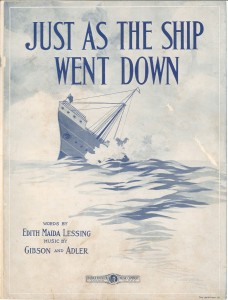
Music about the American South
The Montgomery addendum also contains a small group of songs written about the American South. These songs were often introduced by famous singers and actors like Al Jolson on the vaudeville stage and in minstrel shows, where they used African American characters to paint a sentimental picture of antebellum Southern plantations.
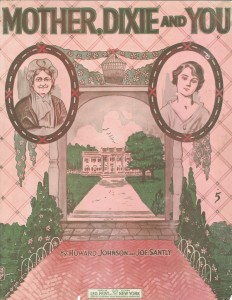
With today’s standards, these songs were racially charged if not outright racist towards blacks, and they presented a view of the South that culturally attempted to roll back the achievements of the Thirteenth Amendment. Even as some questioned their credibility, many contemporary Americans treated these songs as entertainment, listened to them on the popular stage, and played and sang them in their parlors.
Songs from World War One
In two years, we will be observing the centenary of World War One. After the entry of the United States, American society changed as it participated in the war effort. Popular songs from this era reflect how Americans engaged with “the Great War” – emotionally, socially, and culturally. In popular culture form these songs answered the question of ‘why we are fighting over there,’ they boosted the morale on the home front, helped American families endure the absence of their fathers, sons, brothers and husbands, and they depicted relationships between American servicemen and -women and the Europeans they encountered during the war. Americans listened to these songs in recorded form, but they also played them on the piano and sang them in their own living rooms and parlors.
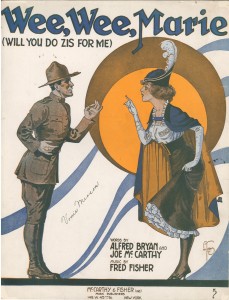
Theatre Music
Other songs in the Montgomery addendum were linked to specific stage productions. In the early 20th century, Al Jolson was one of the artists whose name sold musical plays and their sheet music like candy. Another piece, “I’ll Build a Stairway to Paradise” comes from the Broadway production George White’s Scandals, which ran all through the interwar period and launched the career of several major figures in entertainment.
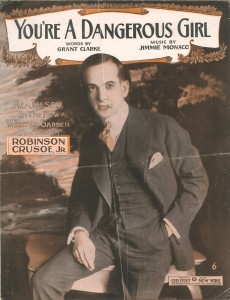
Film Music
The early 20th century saw the overlapping development of old and new entertainment forms, which included the popular stage, gramophone records, the piano in the parlor, the radio, and film. Depending on their social class and wealth, Americans could enjoy many of these. For example, they could go to see a stage production of the famous Siegfried’s Follies Broadway musical, buy its music on recordings, listen to them on the radio, go to the cinema to see a film remake with Fred Astaire, and purchase its songs to play and sing them in their homes.
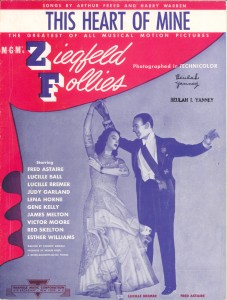
The Beluah Yanney Montgomery Sheet Music Collection will be an important part of our holdings of sheet music from the 19th and 20th centuries. For researchers and fans of U.S. popular culture, these songs say something about the larger American society and the ways people creatively used music for entertainment, social life, education, and emotional expression.